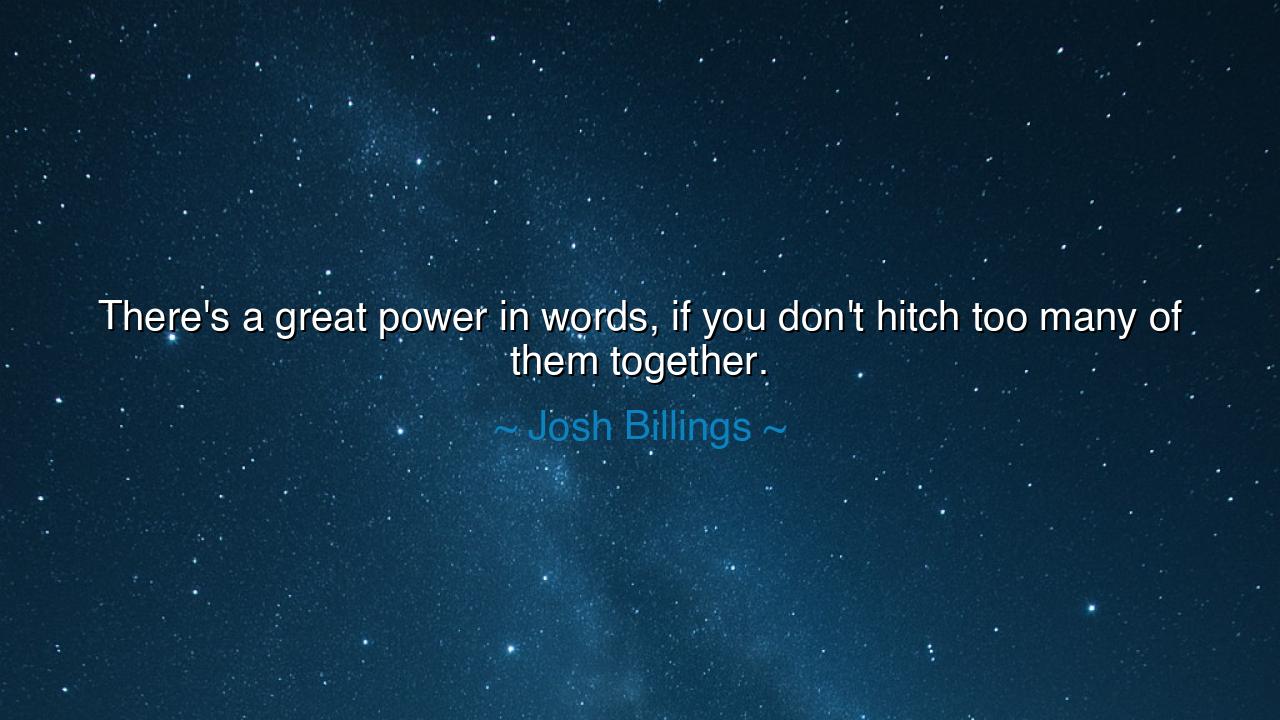
There's a great power in words, if you don't hitch too many of






In the vast realm of human interaction, where the exchange of thoughts and ideas shapes the very fabric of society, there exists a profound truth within the words of Josh Billings: "There's a great power in words, if you don't hitch too many of them together." This simple yet potent observation speaks to the heart of how language functions not merely as a tool of communication, but as a force that can shape minds, move mountains, and inspire greatness—if wielded with wisdom. Yet, it also warns of the folly of overcomplicating what is meant to be simple and direct. Like a sword that can cut through the darkest night, the power of words lies in their precision, not in their quantity.
To understand this concept fully, one must look to the ancients, who knew well the delicate balance between silence and speech. Socrates, the great Greek philosopher, famously held that wisdom lay not in the endless babble of words, but in knowing when to remain silent and when to speak. He believed that the spoken word, when used sparingly and with purpose, had the power to reveal profound truths. However, to speak incessantly, to fill the air with unnecessary words, could cloud the clarity of one’s thoughts and actions. Thus, the lesson from Socrates mirrors Billings' warning: the power of words diminishes when overused, losing their ability to impact with the same clarity and force.
In the grand tradition of rhetoric, the ancient Romans understood this principle well. The legendary orator Cicero was known for his ability to speak with precision and conciseness, wielding his words like a master craftsman with his tools. Cicero's speeches were filled not with a torrent of phrases, but with carefully selected arguments and insights that left an indelible mark on his listeners. Cicero understood that the true power of words lies not in how many are spoken, but in how effectively they are chosen and placed. A single phrase, like the cutting edge of a blade, can pierce the heart of the matter, while an endless stream of words can weaken the very point one hopes to make.
We can also look to the story of King Solomon, known for his wisdom throughout the ancient world. When faced with complex matters of justice and decision-making, Solomon’s words were always measured and deliberate, never hasty or excessive. One of his most famous judgments—the decision to divide a child between two women—was made with profound clarity and purpose, revealing his deep understanding of human nature. Solomon’s use of words demonstrated the power of brevity and discernment in addressing matters of great importance. His example teaches us that words are far more powerful when they are used wisely, not recklessly.
In our modern world, we are constantly bombarded by a sea of words—on television, the internet, in our daily interactions. Speech has become cheap, and the more we speak, the less our words may seem to matter. Billings' words remind us of a simple truth: the most powerful messages often come in the most concise forms. Poetry, for instance, is built on the idea of few words conveying deep meaning. Homer’s Odyssey and Virgil’s Aeneid are two of the most celebrated works in human history, yet they achieve their greatness not through endless paragraphs, but through vivid, poignant passages that stay with the reader for generations. In the same way, we must learn to focus our words, to give them purpose and meaning rather than drowning in the noise of a thousand unneeded phrases.
The lesson from Billings' quote is clear: wisdom lies in the selection and delivery of words, not in their abundance. In our own lives, we must strive to speak less, but with more meaning. The world around us often fills our ears with a constant stream of chatter, but in the stillness, in the moments of silence, the most powerful words can be found. Action, too, is often more meaningful than endless words. As the ancient sages taught, the power of speech is not in how much you say, but in how deeply your words resonate with truth and purpose.
As you move forward in life, remember the lessons of the ancients and the wisdom of Josh Billings. Speak with clarity, speak with purpose, and above all, speak with integrity. Let your words be a reflection of the truth you carry within you, not an endless stream of distraction. Just as the great orators of the past were remembered for their powerful messages, so too will you be remembered by the words you choose to speak. In a world filled with noise, let your words be like a beacon, guiding those around you with their light and clarity. Speak less, but let your words carry the power to move the world.






AAdministratorAdministrator
Welcome, honored guests. Please leave a comment, we will respond soon